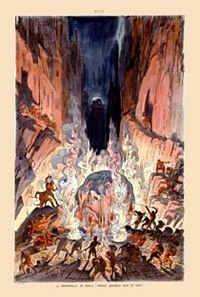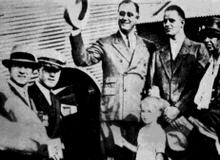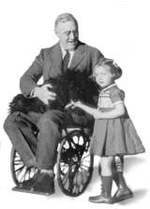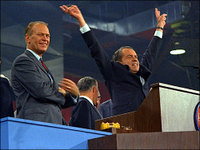No Republican can win the 2008 election. (The picture of a snowball in hell is from Puck Magazine, from the collection of the Library of Congress.)
They may try to steal it. Bush may stage a coup. But they can’t win in a fair fight. No way. Not a chance of a snowball in hell.
This is another of those things the media won’t tell you. While most elections do turn on personality, once in a generation comes an election that truly turns on principle, one that defines politics for the next generation.
Not a change election. An election on principle.
The 2008 election is such a choice. The media wants to tell you that this is somehow about personalities, that somewhere in this vast Republican cattle call is a potential party savior.
There isn’t. No one who does not reject Bushism and the Nixon Thesis of Conflict can be elected, and no one who does not embrace Bushism and the Nixon Thesis of Conflict can be selected. Thus any Democrat will beat any Republican. Mike Gravel would thump Rudy Giuliani. Honest. Joe Biden would stomp Fred Thompson. (Testing these theories will not be necessary. Democrats aren’t going to the second team this year.)
Because this is not an election of personality. It’s not about the
leader. It’s an election about principles. First principles. The
American people want out of Iraq, they want a true War Against Oil,
they want to address the reality of the future rather than a fantasy
based on the past.
In this Americans are far more intuitively aware of their own
history than the media gives them credit for, or that they consciously
admit to. I think most people know this.
But this has happened only twice in the history of living men, so
perhaps we should forgive the media its ignorance of history. (Nyaah.)
In 1932 this was obvious. Herbert Hoover and Republicans everywhere
were stomped, not because FDR was a great personality, but because he
was a skilled politician who understood the tenor of his times and used
it skillfully. Could any of the other candidates from that year — Al
Smith or Newton Baker or John Nance Garner — have won so massive a victory?
Probably not, but there is no doubt they would have won. Americans had
tired of Hoover’s waiting for things to get better, his assumption that
everything which could be done, had been done.
FDR gave them action. Or at least the appearance of action. He was
the first candidate to accept his nomination at the convention. He flew
to the 1932 Chicago convention in an airplane. Pictures show him
standing beside the airplane. Other pictures show him standing at the
podium. Few knew, and no one cared, that all this was artifice, that he
was leaning on his son’s arm with all his strength in the first
instance, that he was using his son and a cane as crutches in the
second instance, that his legs were locked in braces and he was barely
hanging on to that podium, threatening to topple over at any moment. (The picture to the right came out only decades after FDR’s death.)
Instead, they listened:
Our Republican leaders tell us economic laws — sacred, inviolable, unchangeable — cause panics which no one could prevent. But while they prate of economic laws, men and women are starving. We must lay hold of the fact that economic laws are not made by nature. They are made by human beings.
He promised change, a new principle under which the government would
understand the pain of its people and seek to respond. That was enough.
Do you think Richard Nixon was a charmer? He was the least-charming man who ever ran for high office. But in his speech in Miami, in 1968,
he too promised change.
Government can pass laws. But respect for law can come only from people who take the law into their hearts and their minds — and not into their hands.
Government can provide opportunity. But opportunity means nothing unless people are prepared to seize it.
(Gerald Ford as House Minority Leader chaired the 1968 convention.) Nixon’s was not a great speech, he was not a great
personality. Many Americans wanted more. They wanted radical change.
George Wallace promised that change. George Wallace didn’t just win
five states in 1968, he won 13% of the vote, including tens of
thousands in places like Long Island, New York, and other suburbs.
Wallace took Nixon’s margin, but Nixon’s "southern strategy" took it
back, and the politics of a generation were set by that.
So we come to the events of 2008. Barack Obama may be FDR. He’s got
the speaking chops for it. Hillary Clinton might be Richard Nixon.
She’s got the history for it. John Edwards could be either one. So
could Bill Richardson. So, for that matter, could be Joe effin Biden.
Doesn’t matter.
In a time of pain people return to first principles. They demand a fundamentally new direction. They are going to get it, or tear the country
apart.















I see the election coming down to two main issues: immigration and national health care. On immigration, the problem that paleocons like Fred Thompson or Newt Gingrich have is that the anti-immigration loudmouths are in two camps: the rednecks and the Lou Dobbs Democrats. Taking an anti-immigration stand will rule out bringing the still very popular Jeb Bush into the fold. California will actually have some say in the primary season beyond its dollars. Giuliani (my vote) and McCain will be hard to beat. Romney is going to get clobbered in the primaries over MA health care, and he’ll be clobbered by an unlikely but growing demographic: single young (21-39) professionals. This demo is the most likely to get screwed by any national health care plan because they are the ones seen as “underinsured”, i.e. not contributing enough to total health care budget to carry the weight of older, expensive patients or large, young families.
In a general election with Rudy or McCain being pro-choice enough to occupy the middle, being strongly pro-immigration, and being against a national health care boondoggle.. running against a Hillary or Obama who would be more anti-immigration, and for a health care disaster, the R will win, and with unexpected support from young voters.
The war will mean nothing. By January 2008, there are two scenarios. (1) The surge worked and we’re in control and the insurgents are tired of fighting. (2) The surge didn’t work and we’ve given up. By November 2008, there is an additional scenario in play. (3) Something big ala 9/11 happens that makes voters wonder WTF the pacifists were thinking. In which case, Dems better hope Biden is on the ticket, preferably atop it.
I see the election coming down to two main issues: immigration and national health care. On immigration, the problem that paleocons like Fred Thompson or Newt Gingrich have is that the anti-immigration loudmouths are in two camps: the rednecks and the Lou Dobbs Democrats. Taking an anti-immigration stand will rule out bringing the still very popular Jeb Bush into the fold. California will actually have some say in the primary season beyond its dollars. Giuliani (my vote) and McCain will be hard to beat. Romney is going to get clobbered in the primaries over MA health care, and he’ll be clobbered by an unlikely but growing demographic: single young (21-39) professionals. This demo is the most likely to get screwed by any national health care plan because they are the ones seen as “underinsured”, i.e. not contributing enough to total health care budget to carry the weight of older, expensive patients or large, young families.
In a general election with Rudy or McCain being pro-choice enough to occupy the middle, being strongly pro-immigration, and being against a national health care boondoggle.. running against a Hillary or Obama who would be more anti-immigration, and for a health care disaster, the R will win, and with unexpected support from young voters.
The war will mean nothing. By January 2008, there are two scenarios. (1) The surge worked and we’re in control and the insurgents are tired of fighting. (2) The surge didn’t work and we’ve given up. By November 2008, there is an additional scenario in play. (3) Something big ala 9/11 happens that makes voters wonder WTF the pacifists were thinking. In which case, Dems better hope Biden is on the ticket, preferably atop it.
A big terrorist attack would support the anti-war cause not undermine it. The best rhetorical weapon the pro-war side has right now is their ability to correlate our presence in Iraq with a lack of major terrorist attacks in the US. If there were a major successful attack it would not only further discredit the war it would also devalue the Department of Homeland Security.
A big terrorist attack would support the anti-war cause not undermine it. The best rhetorical weapon the pro-war side has right now is their ability to correlate our presence in Iraq with a lack of major terrorist attacks in the US. If there were a major successful attack it would not only further discredit the war it would also devalue the Department of Homeland Security.